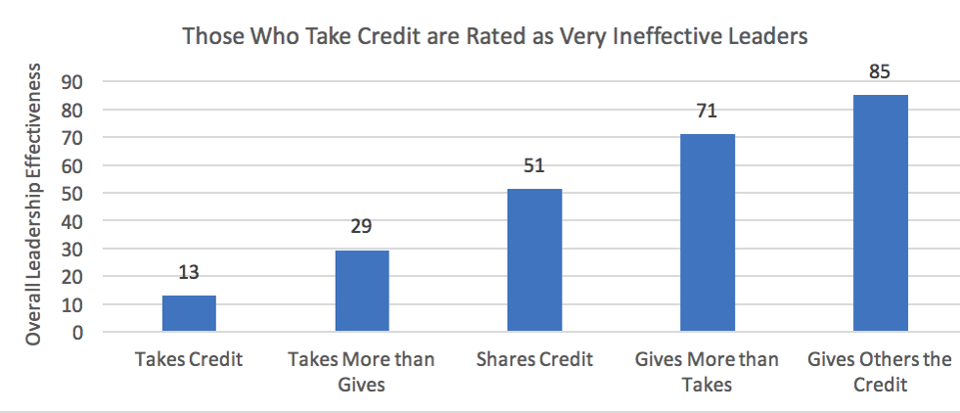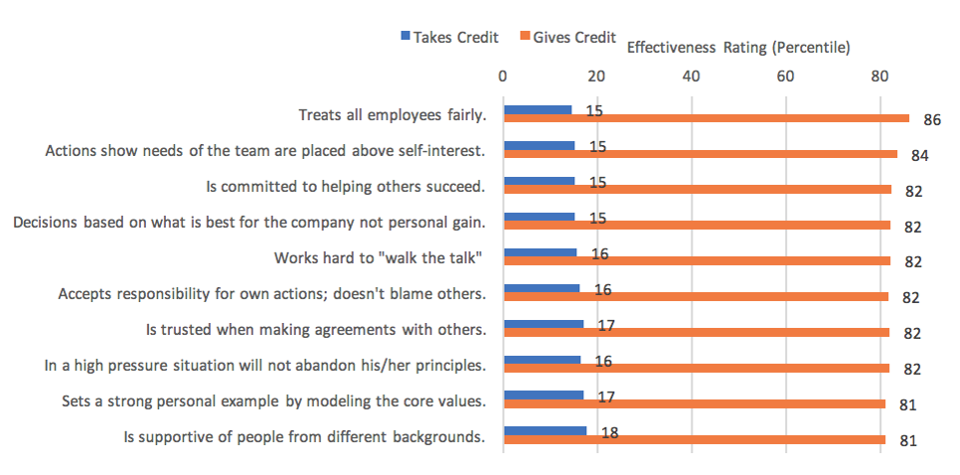It’s All About Me! What Happens When A Leader Takes All The Credit?

Leaders Believe They Value Diversity, But Direct Reports Don’t Agree

3 Reasons To Recruit And Select More Female Leaders


It's All About Me!
What Happens When A Leader Takes All The Credit?
You may know a leader who has a habit of taking credit for others’ accomplishments. Their motive typically is to make themselves look more effective, hardworking, or intelligent than others. The reality is that in most situations at work it’s difficult to accurately assign who deserves credit. Even in situations where a leader does all the work on a new initiative, often their direct reports had to take care of many other assignments to allow the leader the time to produce the new work.
But does taking credit for the work of others, as a strategy to get ahead, help or hinder the leader using that approach? What is the impact of giving others all the credit? To evaluate the impact, I gathered Zenger Folkman assessments from over 3,800 leaders and measured their effectiveness using 360-degree evaluations from managers, peers, direct reports, and others. Each person was assessed on their tendency to take credit from or give credit to others. Their effectiveness was also evaluated on 49 additional behaviors. An average of 10 raters evaluated each person’s effectiveness, with each leader receiving feedback from different perspectives.
The graph below demonstrates the impact of taking or giving others credit on a leader’s perceived overall effectiveness. Those leaders whose tendency was to take credit were rated as very ineffective leaders (13th percentile), while those who tried hard to give the credit to others were rated as some of the most effective leaders (85th percentile). Overall leadership effectiveness measures the overall effectiveness of a leader on a broad set of behaviors. This data demonstrates the dramatic negative effect of taking credit, along with the positive impact of giving credit to others.

Impact Of Taking Credit For Others Work
Very few people doubt the negative impact of taking credit for another person’s work. The question then arises, are certain behaviors more affected by the taking—or giving—of credit? The graph below shows the effectiveness ratings for the top 10 behaviors most affected, for leaders who were rated the lowest in taking credit (bottom 10%) versus those who were rated the highest in giving credit (top 10%). As you read through the list of behaviors, the negative impact of taking credit for others’ work is clear. However, the focus should be on the extraordinary value that comes from giving others all the credit. Many people underestimate the tremendous impact that comes from making an effort to give credit to others.
This graph clearly demonstrates the positive value created when all the credit is given to others. While those who assume that by taking credit for others’ work they are getting ahead at work may find that it creates a small temporary advantage for them, the negative impact it creates is like a tsunami wave—eventually, it will come back and drown them.
Read more
Source: Forbes



